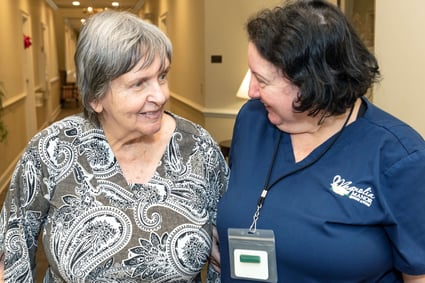Download our Free Guide:
Senior Living Explained
Learn what different types of senior living care are available and which one best fits your needs now and in the future.

.jpeg)
.jpg?width=600&height=543&name=Mattie%20H.%20Marshall%20-%202024%20NALW%20Western%20Day%20(9749).jpg)
Caregiving doesn’t stop once your loved one moves to senior living. But it does change. You can relinquish the strain of worrying about your loved one’s well-being while performing daily care tasks and go back to being their loving spouse, daughter, or son. You also become their senior living advocate.
 If you're feel guilty about moving Mom into assisted living, for example, know that this is normal. It’s a major change, physically and emotionally, for both of you. However, you can continue contributing to her well-being and happiness.
If you're feel guilty about moving Mom into assisted living, for example, know that this is normal. It’s a major change, physically and emotionally, for both of you. However, you can continue contributing to her well-being and happiness.
You may not be there every day or able to pop in regularly to see how she is doing. So, now you have to rely on others – the professionals who are on the scene – to stay informed and proactively involved in Mom’s care.
Advocacy Starts with Choosing the Right Community
.jpeg?width=425&height=392&name=Resident%20and%20Family%20(2642).jpeg) Will Mom be safe and secure in this new home? Are the staff well-qualified but also compassionate and personable? What will Mom’s accommodations and daily routine be like? Is the food good? These are key concerns adult children and seniors themselves have when considering senior living, and you can learn the answers before you make a decision.
Will Mom be safe and secure in this new home? Are the staff well-qualified but also compassionate and personable? What will Mom’s accommodations and daily routine be like? Is the food good? These are key concerns adult children and seniors themselves have when considering senior living, and you can learn the answers before you make a decision.
Whether your loved one will start out as an independent resident, in assisted living, in memory care, or with more advanced skilled nursing care, knowing she’s in the best possible place with great people will give you confidence and peace of mind.
Still, it’s not a handoff -- active advocacy helps ensure Mom is happy and continues to receive the care she needs, even as those needs change. You’re in the best position to serve in this special role because you know her well and you want the very best for her.
.jpg?width=425&height=283&name=St.%20Marys%20-%202024%20Low%20Country%20Boil%20(4305).jpg) What to Watch For
What to Watch For
There are two separate but interrelated aspects to senior living – the healthcare side and the lifestyle side.
As a health advocate, you can help manage Mom’s care by:
 Regarding her daily living, how does she seem to you when you visit or talk on the phone? Is she comfortable with the routine? Participating in activities? Making friends? Eating well? Getting enough rest? Is she clean and well-groomed? Is she still sharp, or does it seem as if her memory or cognition is starting to diminish?
Regarding her daily living, how does she seem to you when you visit or talk on the phone? Is she comfortable with the routine? Participating in activities? Making friends? Eating well? Getting enough rest? Is she clean and well-groomed? Is she still sharp, or does it seem as if her memory or cognition is starting to diminish?
Listen between the lines as you chat. Has her behavior or demeanor changed? If anything seems off, even a little, share that information with staff so they can investigate further.
 Team Up with Staff
Team Up with Staff
Staff interact with residents every day, so they are a good source of information about how Mom is doing. They are busy, but they expect you to ask questions and are happy to give you updates. After all, everyone’s goal is the same – a carefree life for Mom that is as active, interesting, and independent as possible.
When Mom first arrives, share with staff details about her that might not be readily apparent or that she might not think to mention. Knowing more about her history, habits, and preferences will make it easier for staff to personalize Mom’s experience and help her find new friends and favorite activities faster.
 Stay Involved as Much as Possible
Stay Involved as Much as Possible
Elders sometimes secretly worry that moving to senior living means they might be forgotten. So maintaining your connection is even more meaningful now. Visit as often as you can, if you can. Drop by to socialize or share a meal, take Mom to church, work together on a hobby or go for a walk. Check the community’s monthly calendar to learn of opportunities for families to join residents to enjoy special events and activities.
Resources to Help Advocates
Establishing a good relationship with staff at your loved one’s senior living community is a top priority. But ask about other opportunities to advocate for your loved one. For example:
If you have very serious concerns, there are organizations and law firms that specialize in eldercare issues and advocacy. The National Center on Elder Abuse can also help.
Magnolia Manor is Here for You and Your Loved One
At Magnolia Manor, we believe advocacy starts with us. Caring for seniors with skill and compassion is our mission. We consider ourselves to be one big family, so we treat every resident as if they were our own loved ones. But we know they are your loved one first and foremost, and we’re here to help you advocate on their behalf. Schedule a tour today or give us a call at (855) 540-LIFE to discover how wonderful memory care can be!
Learn what different types of senior living care are available and which one best fits your needs now and in the future.
